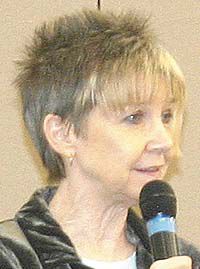| Donna Fisher teaches how to learn to network more efficiently. |
Donna Fisher, established Donna Fisher Presents to teach people the art of networking and its importance in their daily personal and business lives. She gave everyone who attended Sen. Bob Bennett’s Rural Business Conference a taste of the possibilities of networking.
Networking, noun: The exchange of information or services among individuals, groups, or institutions; specifically, the cultivation of productive relationships for employment or business.
Fisher explained that if everyone in the room had connections with 500 family, friends and business associates, and for the 500 people in attendance, it would amount to a quarter of a million resources. “No matter how high tech we get, nothing will replace the power of people skills,” she stated. “In this room, there are people from every walk of life. There are government people, educators, and small business owners. Each of these people is special and each one has a network of contacts.”
Fisher compared networking to old fashioned quilting bees or barn raisings. Those consist of a large group of people coming together to accomplish a common goal more quickly and efficiently than one person could do the same job. “Everything we need is always right around us. We need to see each and every person as a network and share with one another. We should stay aware and tap into and utilize those contacts. You never know what connection you might need until you need it,” expressed Fisher.
Networking is connecting with other people through conversation. These connections will help you create better opportunities for yourself. She listed the six principles of power networking. Number one is the power of speaking up. When introducing yourself to someone, don’t just say your name and your title. Give a little extra about who you are.
Number two is listening. It is through listening that a connection with someone is made. Utilize the small talk. Listen for how you can help another person with what you have to offer.
Number three is asking. Most people fear rejection and this stops them from asking for what they need. The are afraid they won’t fit in or feel like they belong. Be very specific with your requests, do not make a broad request.
The fourth principle is giving. Give of your knowledge and talents to help someone else. The more you give, the more you will get back. Number five is praise. Handwritten notes of thank you and praise are especially personal. The main thing is to express your gratitude to someone who has helped you.
The final principle is to think big. “You don’t have to know everything there is to know,” said Fisher. “You just need to have a community of people you can call on for answers.”
Fisher told how these networks and connections should be in place before the need is critical. Everyone needs to work on their communication and relationship skills to establish a network. A final thought she left everyone with was, “If you want to be prosperous for a year, grow grain; if you want to be prosperous for 10 years, grow trees; if you want to be prosperous for a lifetime, grow people.”
Fisher led a speed networking session in which everyone in attendance sat at tables, across from each other. They were then instructed to introduce themselves to the person directly across the table. After three minutes of conversation, they moved on to another person.
During the three minutes, the people exchanged business cards and made a connection. She encouraged each person to look for ways they could be of help to the other person. During the hour session, each person who attended made at least 15 new contacts that may be utilized in the future. They also met 15 people they may potentially help in some way.

